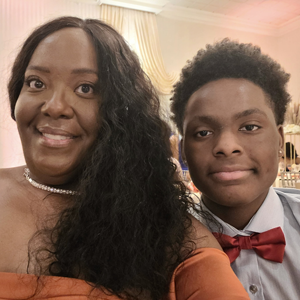The burden of eczema can be heavy, but the condition is often misunderstood. It’s not just a skin disease or rash. Eczema affects the whole person, mentally and physically, and can greatly impact their quality of life.
October is National Eczema Awareness Month. During the month, the Asthma and Allergy Foundation of America (AAFA) is working to raise awareness of the burden of eczema. By raising awareness, we can improve eczema treatment options, make treatments more accessible, reduce racial disparities, and improve quality of life.
To raise awareness about eczema, AAFA and five other patient organizations came together on a project called More Than Skin Deep. We surveyed patients and caregivers on what it is like to live with and manage eczema. We then presented the results to the Food and Drug Administration (FDA) to help inform research and development for eczema treatments.
Findings from the project help us all better understand what it’s like to live with eczema. A better understanding can also lead to better treatments. Here are some findings from the report.

“When I first started in dermatology, I thought of eczema as a children’s disease. Then I noticed how many patients in our adult dermatology clinics were dealing with it and how it impacted nearly every aspect of their lives, health, and work. That’s what turned me on to this field of research.”
− Aaron Drucker, MD
The Prevalence of Eczema
Eczema is a common condition in the United States. About 16 million people have eczema. Of those people, 6.6 million report having moderate-to-severe eczema.
- 7 to 11% of adults have atopic dermatitis (AD), the most common form of eczema
- 13% of children in the U.S. have AD
- 46% of caregivers of children with AD saw the condition get worse over time
- 49% of adults with AD saw their condition get worse over time

“The mental aspect of this disease is so real. Sometimes I’d sit in the parking lot at work, scared to go home and learn how things had gotten worse. … My hope for the future is that there will be more research into how eczema and its treatments affect different people differently, especially people of color, so we can find better, more personalized solutions for everyone.”
− Jed Cutaran, caregiver
The Mental, Emotional, and Social Burden of Eczema
The burden of eczema impacts adults, children, and their caregivers. Eczema has an overall negative impact, with mental, financial, social, and physical effects. According to the More Than Skin Deep project, 79% of adults with AD said they have mood changes because of their condition.
Many adults with eczema also report:
- Physical and emotional exhaustion
- Negative impacts on relationships
- Embarrassment
- Isolation
Trouble sleeping also is a common problem for people with eczema. Around 48% of caregivers reported sleep problems as their child’s greatest issue.

“This is a disease of vicious cycles. The same psychological stress and sleep deprivation that damages our skin barrier and decreases our ability to heal from wounds also drive our immune system crazy. They act as a double-edged sword, causing people with AD to feel unfocused and foggy, a state that can often extend beyond the patient to family and caregivers.”
– Peter A. Lio, MD
Eczema Treatment Is Not One-Size-Fits-All
Eczema affects each person differently. It is a life-altering condition without a one-size-fits-all approach to treatment.
Eczema treatment often involves several methods. And many people have to change their treatment regimen often as effectiveness changes. Many caregivers are concerned about long-term use and the number of side effects of current treatments.
Managing eczema takes a lot of time. Nearly half of adults with eczema spend five to 10 hours a day managing their symptoms. Many caregivers of children with eczema spend around 11 hours a week managing symptoms. But treatment isn’t always effective.

“My hope for the future is more − more treatment options, more accessible, affordable drugs that meet people’s needs where they’re at, and more research, especially involving people of color. Eczema may be a common disease, but it’s not one thing, and every case is different. We need to treat each person holistically, based on their unique symptoms and experiences.”
− Akilah Evans-Pigford, patient and caregiver
How to Raise Eczema Awareness
Raising awareness of the burden of eczema can lead to better treatment, management, and quality of life. Greater participation in clinical trials can bring about new treatments that meet the needs of people with eczema. Better awareness can also reduce disparities and improve access to care.
AAFA has eczema awareness resources you can share to help us get the word out. We have a number of awareness images you can share on social media, as well as social profile images and ready-to-tweet facts.
You can also donate to AAFA’s efforts to allow us to continue to offer support to people with eczema and advocate on their behalf.
Thank you for helping us raise awareness during National Eczema Awareness Month.
Learn more about the More Than Skin Deep project.
Eczema is not a condition you have to face alone. Our online community is for people to share and learn together in an encouraging and supportive environment. Join our free community to connect with others, keep up to date on news and research, and to learn ways to best manage your conditions. We can overcome eczema better together.





Comments (1)